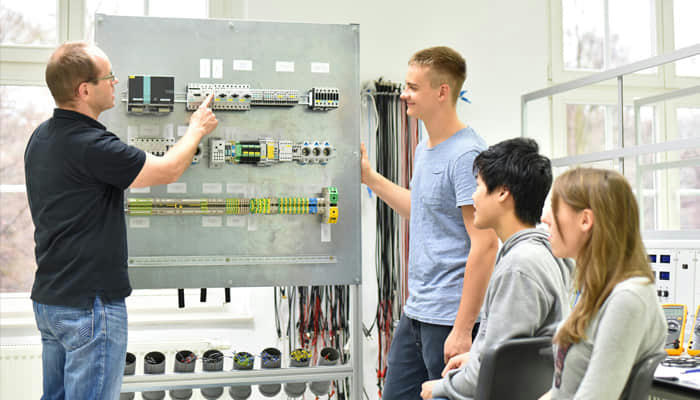Electrician Training Made Easy
Electricians are the unsung heroes of the modern world, ensuring that our homes, businesses, and industries have safe and reliable access to electricity. With their specialized skills and expertise, electricians play a crucial role in maintaining and improving our electrical infrastructure. Becoming an electrician requires dedication, training, and a commitment to safety and excellence in the field.
What is an Electrician?
Electricians are highly skilled professionals who play a critical role in ensuring the safety and functionality of electrical systems. They work in a variety of settings, from residential homes to commercial buildings and industrial facilities. Electricians are responsible for installing new electrical systems, maintaining existing ones, troubleshooting issues, and ensuring that all work meets safety regulations and building codes.
Requirements for Becoming an Electrician

Becoming an electrician involves a combination of formal education, hands-on training, and licensure. Prospective electricians typically start by enrolling in an apprenticeship program, where they work under the supervision of experienced electricians while also taking classroom courses. Apprenticeships provide valuable real-world experience and allow individuals to learn the skills and knowledge necessary to excel in the field. In addition to completing an apprenticeship, most states require electricians to obtain a license, which may involve passing an exam demonstrating their competency.
It is also important to note that the path to licensure and certification can vary depending on the location and specific regulations of the governing body. In addition to completing an apprenticeship program, individuals aspiring to become electricians may need to fulfill certain educational requirements, such as obtaining a high school diploma or GED. Some programs may also require applicants to pass a basic aptitude test to demonstrate their readiness for the training.
During the apprenticeship period, which typically lasts between three to five years, aspiring electricians acquire practical skills and knowledge through on-the-job training and classroom instruction. They learn how to work with various electrical systems, tools, and equipment, as well as how to interpret blueprints, follow safety protocols, and troubleshoot common issues. The hands-on experience gained during the apprenticeship is invaluable in preparing individuals for the challenges and responsibilities of a career as an electrician.
In addition to completing the required training and gaining practical experience, electricians must also obtain a license to legally practice in their jurisdiction. Licensure requirements typically include passing a comprehensive exam that tests the individual's understanding of electrical theory, codes, and regulations. Some states may also require electricians to demonstrate a certain number of hours of practical experience or complete continuing education courses to maintain their license.
Overall, the path to becoming a licensed electrician is a rigorous and rewarding journey that requires dedication, hard work, and a commitment to lifelong learning. By meeting the necessary requirements and obtaining the proper credentials, aspiring electricians can embark on a fulfilling career that offers stability, growth opportunities, and the chance to make a tangible impact on the world around them.
Course Curriculum for Electrician Training
Electrician training programs cover a wide range of topics to provide students with a comprehensive understanding of electrical systems. Courses typically include electrical theory, electrical code regulations, wiring techniques, safety practices, blueprint reading, and mathematics. Students also gain practical experience working with various tools and equipment commonly used by electricians. Additionally, some programs offer specialized training in areas such as renewable energy, green technologies, or advanced electrical systems.

Students can expect to delve into a variety of essential subjects that are fundamental to the field of electrical work. Electrical theory courses provide a solid foundation by exploring the principles of electricity, circuits, and electrical components. Understanding these concepts is crucial for electricians to troubleshoot issues, design systems, and ensure the safe and efficient operation of electrical systems.
In addition to electrical theory, training programs also cover electrical code regulations, which are a set of standards and guidelines that govern the installation, maintenance, and repair of electrical systems. Knowledge of these regulations is essential for electricians to ensure that their work meets industry standards, complies with legal requirements, and maintains the safety of occupants and property.
Wiring techniques are another key component of electrician training, as students learn how to properly install and connect electrical wiring, devices, and fixtures. This includes hands-on practice in working with different types of wiring materials, tools, and equipment to effectively and safely complete electrical installations.
Safety practices are emphasized throughout electrician training programs to instill a culture of safety awareness and compliance among students. Topics such as hazard recognition, personal protective equipment, emergency procedures, and electrical shock prevention are covered to ensure that electricians prioritize safety in all aspects of their work.
Blueprint reading is a critical skill that electricians must master, as it allows them to interpret technical drawings, schematics, and plans to understand the layout and specifications of electrical systems. Proficiency in blueprint reading enables electricians to effectively communicate, plan, and execute electrical installations based on project requirements. Mathematics is another important component of electrician training, as it is used to calculate voltage, current, resistance, power, and other electrical parameters. Basic math skills are essential for electricians to make accurate measurements, perform calculations, and troubleshoot electrical problems.
Some electrician training programs also offer specialized courses in areas such as renewable energy, green technologies, or advanced electrical systems to meet the growing demand for sustainable and energy-efficient solutions in the industry. By completing a comprehensive curriculum that covers these key areas, aspiring electricians are equipped with the knowledge, skills, and practical experience needed to succeed in this dynamic and essential field.
Career Prospects for Electricians

Electricians enjoy strong job prospects due to the constant demand for their services. With advancements in technology and increasing emphasis on energy efficiency, the need for skilled electricians is expected to grow. Electricians can pursue various career paths, such as working for electrical contractors, construction companies, maintenance departments, or government agencies.
Some electricians choose to specialize in specific areas, such as residential wiring, commercial installations, or industrial maintenance. Others may explore opportunities in emerging fields like smart home technology, solar energy, or electric vehicle charging stations. The flexibility and versatility of the electrician profession make it a rewarding choice for those seeking a hands-on, dynamic career with opportunities for growth and advancement.
As the demand for skilled electricians continues to rise, the future looks bright for those pursuing a career in this dynamic and essential field.
